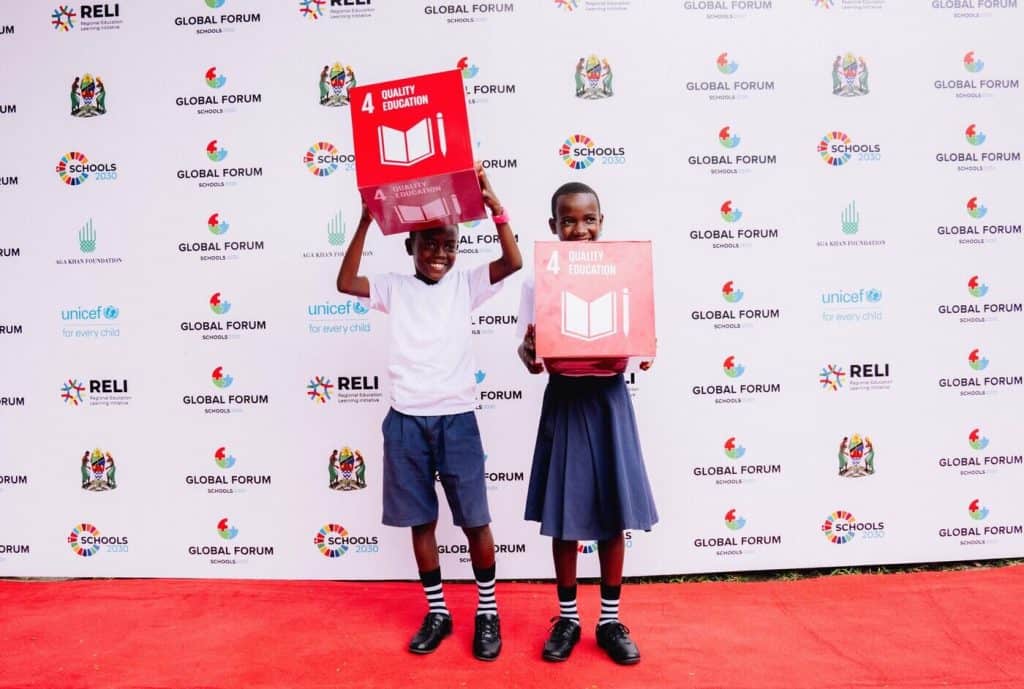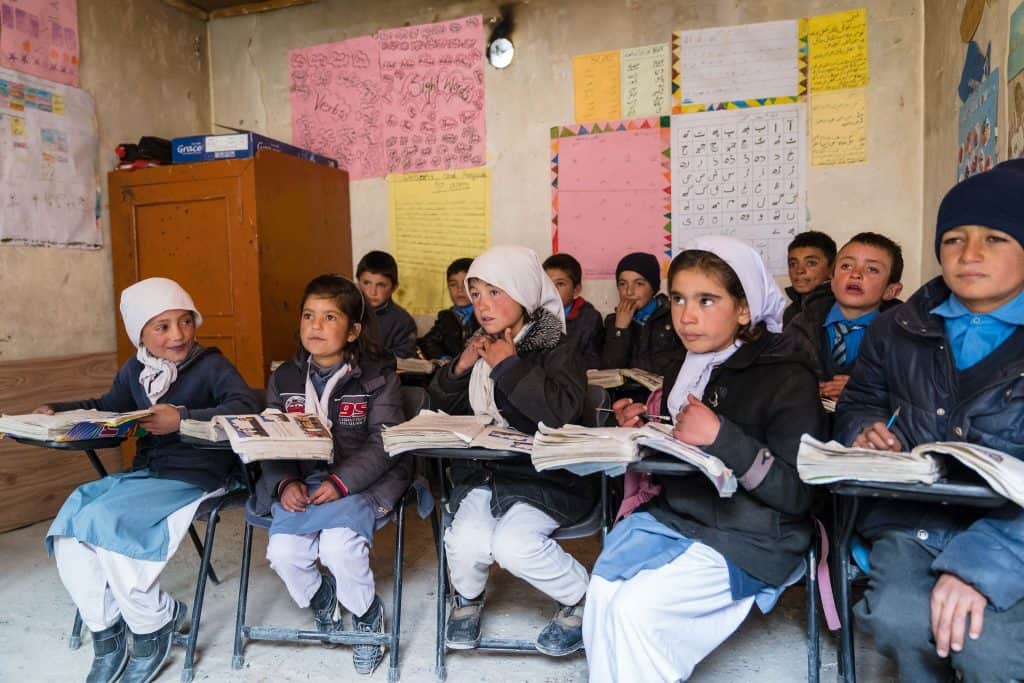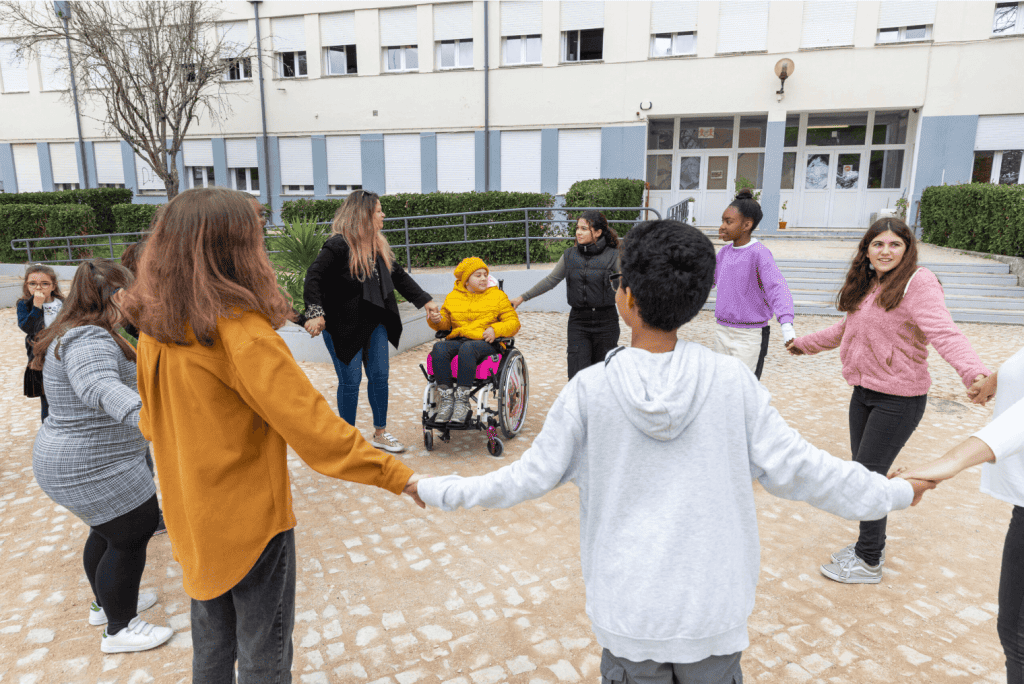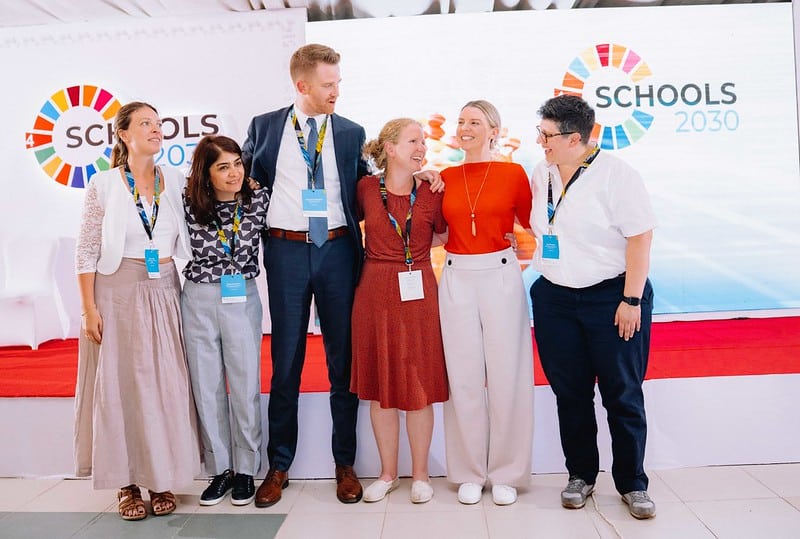The second annual Schools2030 Global Forum is just around the corner! From 5th to 7th June, more than 250 delegates from across global education sector will meet in Porto, Portugal, for an extraordinary opportunity to learn, grow, and share together.
As the Aga Khan Foundation’s (AKF) flagship education programme, Schools2030 will welcome a diverse cohort of delegates, from teachers and students to policymakers and donors, to explore diversity, inclusion, and pluralism in schools and education systems around the world.
We spoke to AKF’s Bronwen Magrath, Global Programme Manager for Schools2030, to find out more about the Forum, what to expect from this year’s event, and how everyone can get involved.
What is your role at AKF and Schools2030 and what do you enjoy most about your work?
As the Global Programme Manager for Schools2030, I oversee the programme across the ten countries as well as the technical work streams and teams at the global and country level. That is what I enjoy most about the work – I really love the people. It’s a fantastic job because I get to work with incredibly passionate and committed teams of AKF staff and partners across all ten countries and at the global level.
For those who don’t know, please could you explain what Schools2030 is, how it came about and how it’s linked to AKF?
Schools2030 is a ten-year participatory learning improvement programme. We’re working in 1,000 government schools and community learning centres across ten countries and nine of those ten countries are locations where AKF is already implementing various education improvement programmes. AKF is the lead implementing organisation of Schools2030, but it’s also one of the donors. The goal of Schools2030 – like education at AKF more broadly – is to raise holistic learning outcomes. By that we mean equipping young people with the knowledge, skills, attitudes, and values they need to thrive and to contribute to their community.
One thing that is special about Schools2030 is our focus on teacher agency. We recognise and work to amplify teachers as leaders, innovators, and active education agents. Over the past two years, we’ve developed a suite of different tools, resources, and training modules with and for teachers that can support them to develop, target and contextualise classroom-level education innovations to improve learning. Schools2030 was conceived as an experimental approach which follows the ethos that the best ideas come from classrooms and teachers.
“One thing that is special about Schools2030 is our focus on teacher agency. We recognise and work to amplify teachers as leaders, innovators, and active education agents.”
The Schools2030 Global Forum kicks off on 5th June – could you tell me more about the Forum and why it’s happening?
This is our second annual Global Forum and this year it is going to be held in Porto, Portugal, from 5th to 7th of June. It’s co-hosted by AKF and the Aga Khan Development Network, as well as the Government of Portugal and the Municipality of Porto. Along with the co-hosts, there will be a diverse mix of people coming together. It’s different than many other events in the international education sector because we have teachers, policymakers, government, researchers, and donors, all sitting together to discuss how we can better work to achieve Sustainable Development Goal 4 (SDG4), which commits the global community to provide free, equitable, quality education for all children and youth.
This year the theme of our forum is guided by the question: how can we foster more inclusive schools and pluralistic learning societies by 2030? This emphasis on inclusion and equity is central to AKF’s work in education and beyond, and it’s also very important to the Portuguese context and the other contexts in which we’re working.

What key learnings have you and the team taken from last year’s Global Forum in Dar es Salaam and is there anything new that delegates can expect to see this year?
Delegates who attended in Dar es Salaam last year will see a lot of familiar features. For example, the focus of the Global Forum is very much on discussion and dialogue, so most of each day is spent in deep dive discussions and workshops. Whilst we spend less time in the traditional conference panel, we do open each day with a diverse panel of speakers to set the tone for the day’s discussions. That is then followed by a panel of teachers from across Schools2030 countries who share some of the innovations they’ve developed to improve equity and inclusion.
One thing that is new this year which I’m quite excited about is that we have crowd-sourced ideas for the workshops. When we invited them to the Forum, we asked all delegates to propose challenge session workshops that they would like to lead. For example, is there an equity related challenge in their programming, research, or funding that they would like to bring to the Forum? This enables a diverse mix of delegates to brainstorm and problem-solve together. We’ve had lots of great ideas come in and we’ve also been able to organise delegates into groups. There will be people working through similar challenges, who don’t necessarily know or work together. I hope that everyone will be really engaged – firstly because they are live problems that the delegates are looking to solve now, and secondly because it’s an excellent opportunity to collaborate in ways that many may not have before.
Speaking of collaboration, why is bringing the sector together for events like this so important?
Events like this are critical moments for us to come together as a sector and drive forward our goals. SDG4 frames what almost everybody working in the global education sector is working towards and events like this offer a moment where we can assess our progress and chart out collective challenges and common paths forward. All our voices in separation cannot address the education crisis, but if we come together, we’re stronger together. As we said at the last Global Forum, “alone we go fast, together we go far.”
AKF and Schools2030 attend many other events in the sector, including the Comparative & International Education Society (CIES), the Transforming Education Summit, and the UN General Assembly. These offer opportunities for discussion, new research findings to be put forward, and new approaches to be shared. The one thing that Schools2030 offers that is a little bit different to other large global education events is the diversity of voices we bring together. We deliberately organise sessions including a civil society actor, a Minister of Education, leading academics, donors, and primary school teachers all sitting together at the same table.

On that note, who will be attending this year’s forum?
It is an invitation only event and we try to keep it to a size that enables diverse voices to be heard, but also not so big that you lose that sense of community. We invite a wide range of people from many different countries, sectors, and stakeholder groups because we believe that an inclusive, diverse sector dialogue is fundamental to addressing the education crisis.
This year, we have several exciting VIPs attending, including the Ministers of Education from Portugal and from Kyrgyzstan (Kyrgyzstan will be hosting the Forum next year), the Mayor of Porto and several other high-level dignitaries. But we’re just as honoured to welcome teachers from preschools, primary schools, and secondary schools from across and beyond Schools2030’s programme countries. There will be teachers from East Africa, South Asia, Central Asia, Portugal, and Brazil, all there together with the policymakers and Ministers of Education. This is so important because teachers are at the frontline of addressing the education crisis and it’s their voices that we must listen to most keenly. Personally, I have never been to an education conference where there have been more than 30 teachers from across the globe present. Last year, many of them told us that they really loved the opportunity to connect with other teachers from different countries and recognise that so many of the challenges they’re facing go across borders.
“[Teachers] loved the opportunity to connect with other teachers from different countries and recognise that so many of the challenges they’re facing go across borders.”
Is there anything that you and your team are most excited about this year’s forum in Porto?
Firstly, we’re excited to be in the beautiful city of Porto and to be hosted by the amazing AKF Portugal team. But the most exciting part for all of us is the chance to get together; as a team we speak online once a week, but the Global Forum is the only time we all get together in person. It’s valuable time to spend together and we can progress so much in strategy and planning because we’re all there as a full team.
Another exciting feature that came out of the Dar es Salaam Global Forum is the involvement of youth. Last year we received feedback that whilst it was amazing to have teachers present, where were the young people? We’ve taken that on board and this year we have invited around 30 young people from Porto and from across Portugal to participate in the Forum. They’ll be in the workshops and panels as active participants on the same level as everyone else. It will be a really great opportunity for youth to engage in education advocacy and think beyond the learning in their classrooms.

For those who won’t be attending the Forum in person, how can they get involved?
For this year’s forum, we are thrilled to be live streaming the opening panels each day. We will also be sharing a lot of learning, discussions, progress, and general updates via the Schools2030 and AKF Global social media channels. So, even if people are not able to attend in person, they can still be part of the Forum virtually.
The next Schools2030 Global Forum – How might we foster more Inclusive Schools and Pluralistic Learning Societies for all by 2030? – will take place in Portugal in June 2023. Find out more here.
